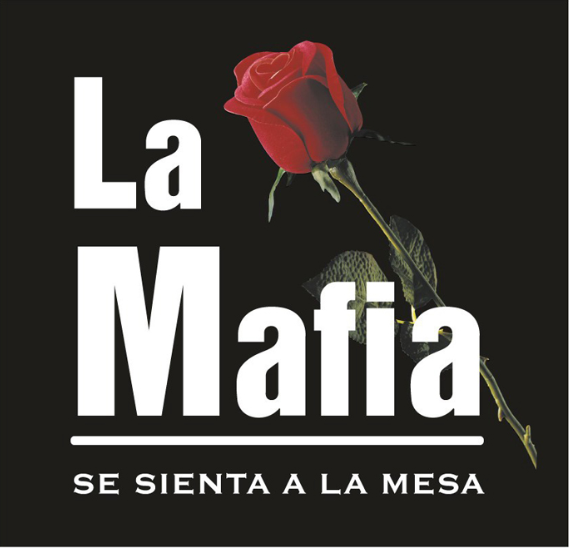Back in 2007 the EUIPO granted a trade mark registration for the illustrated mark in the name of La Mafia Franchises, SL (LMF) for goods and services in classes 25, 35 and 43.

The mark is used in Spain in relation to a chain of over 40 Mafia-themed restaurants serving traditional Italian fare with “se sienta a la mesa” in the mark translating to “take a seat at the table”.
On 23 July 2015 the Italian Republic filed an application for a declaration of invalidity with the EUIPO against the registration on the basis of (the now) Article 7(1)(f) of Regulation (EU) 2017/100 i.e. that the mark is contrary to public policy or to accepted principles of morality. The Italian Republic’s argument was that ‘Mafia’ referred to a criminal organisation and therefore using it in relation to a restaurant chain had the effect of “arousing deeply negative emotions”, “‘manipulating’ the positive image of Italian cuisine” and “trivialising the negative meaning of that element”.
On 3 March 2016 the Cancellation Division upheld the Italian Republic’s claim and LMF subsequently unsuccessfully appealed that decision to the First Board of Appeal. LMF made one (probable) last ditch attempt with an appeal to the General Court, but failed.
General Court judgment
At the outset of its decision, the General Court said that type of marks that would be caught by Article 7(1)(f) are those marks that are “deeply offensive”. But what is “deeply offensive”? The General Court said that the line falls somewhere in the middle between the relevant public being considered not to be offended by anything at one end, to the other extreme of the relevant public being considered to have a particularly sensitive disposition. Somewhere in the middle, according to the General Court, is the “reasonable person with average sensitivity and tolerance thresholds”. The relevant public in this context is also not apparently limited to a user of the goods or services in question but also includes those who may only incidentally come across the mark. Adding a further subjective consideration to the mix, the General Court also noted that whether a sign is perceived as contrary to public policy or to accepted principles of morality will differ across the Member States due to the linguistic, historic, social and cultural differences that exist.
Turning to the mark in question, among other arguments put forward by LMF that it disagreed with, the General Court was unconvinced by LMF’s argument that ‘La Mafia’ was not a dominant part of the mark, noting that the red rose and ‘se sienta a la mesa’ occupy only secondary positions in the mark. Further, it disagreed that the mark implies a reference to the Godfather series of films, which is not that surprising considering there is nothing in the mark suggesting such a link.
LMF also argued that the goods and services applied for were not ‘communicative’ services in the sense of conveying messages to the public. Rather, LMF contended, the public would understand that the purpose of the mark was to indicate a restaurant chain with a Godfather film theme, as opposed to referring to the Mafia. Therefore, the purpose of the mark was not to convey an offensive message. The General Court disagreed, pointing out that the ‘purpose’ of the registration, i.e. the goods and services for which protection is sought, is irrelevant to the ‘perception’ of the mark by the public. It also noted that the existence of films and literary works about the criminal organisation does not alter the perception of the harm and damage caused by the Mafia.
It also did not matter that the Mafia is not listed in the Annex to Council Common Position 2001/931/CFSP of 27 December 2001 on the application of specific measures to combat terrorism. EUIPO guidance notes that marks which support individuals or groups on that list would be caught by Article 7(1)(f). As the EUIPO guidance states, and as reiterated by the General Court, this is just one example of marks that are unacceptable, it is not exhaustive. Nor did it matter that there are other MAFIA marks on the EUTM and Italian registers.
The General Court referred to the fundamental values of the European Union, noting that the Mafia’s unsavoury ‘activities’ are in particular conflict with respect for human dignity and freedom. The General Court also noted that the name Mafia has “deeply negative connotations”, in Italy in particular, and pointed to the criminal law in force there to combat membership/support of the organisation. As the mark would very likely bring such a criminal organisation to the mind of the relevant public, the General Court refused the appeal, finding that that the mark is of “bad taste” (hopefully, for its diners at least, this is not a literal reflection of the restaurant chain). LMF was also ordered to pay costs; perhaps the Italian government will put its contribution towards fighting the real Mafia.
Interesting questions raised
- What are “average sensitivity and tolerance thresholds” and how do we measure or apply them? This is a highly subjective standard, which is further complicated by the fact that the relevant public can be any member of the public who incidentally comes across the mark, rather than at least being limited to the users of the goods/services in question.
- Not only do common EU values have to be considered, but also the values of individual Member States which, as the General Court noted in its decision, vary due to vast linguistic, historic, social and cultural differences between them all. How then can we ensure consistent decision-making? Against a background of such emotive value-weighing, it is not surprising that other MAFIA marks have made it onto the EUTM register. Perhaps it is therefore only a matter of time before the Italian government makes the EUIPO more invalidity “offers” it “can’t refuse”.
Adrian Smith is a Partner at Simmons & Simmons and a member of the IP Emerging Issues Team
 Issue 092
Issue 092
 Issue 092
Issue 092